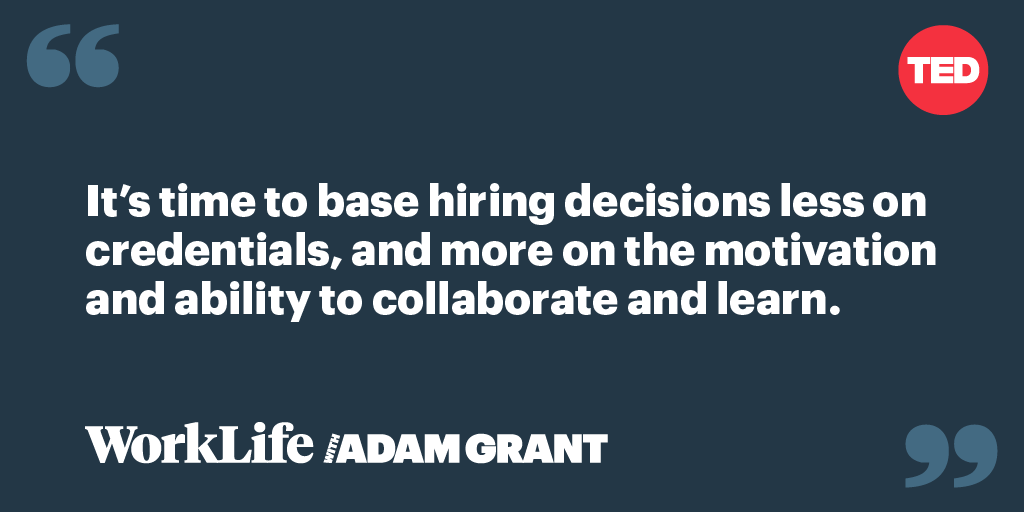
Reinventing the Job Interview
Managers are constantly betting on the wrong people—and turning down the right ones. Sometimes it’s because they’re looking to hire themselves. Other times it’s because they’re too focused on outsmarting candidates by making them do long division or brainteasers about how many paper clips can fit in Yankee stadium. And in many cases, it’s because they’re obsessed with credentials rather than skills and values.
Job interviews are broken. Today’s episode of WorkLife is about how we can fix them. You can listen here and discuss below. Highlights:
Replace open-ended questions with structured interviews. Identify the key qualities you’re looking for in candidates, design relevant questions in advance, and have multiple interviewers evaluate their responses. You can create a scoring key by giving your questions to your existing people and seeing how star performers respond differently.
Behavioral questions aren’t always the best option. “Tell me about a time when…” can help you predict future performance from past behavior. But not everyone has a relevant story from their past. If you want a window into how candidates will do unfamiliar tasks—and a glimpse at their leadership potential and interpersonal skills—you want to add some situational questions: “What would you do if…”
Don’t just pay attention to what candidates say—let them show what they can do. Chef Dave Chang, the founder of Momofuku and star of Ugly Delicious, asks candidates to make him an omelet. He’s not looking for perfection; he’s interested in their attention to detail. These kinds of work samples allow candidates to showcase their strengths in tasks that are directly relevant to the job. To see work samples in action, we take a trip to the software company Menlo Innovations, where they’ve abandoned resumes and interviews altogether in favor of auditions that allow candidates to demonstrate their motivation and ability to collaborate and learn.
Algorithms can catch things that humans miss… and vice-versa. My colleague Cade Massey has been studying hiring algorithms for years, and we have a debate about when and how to use them. One of the places where we end up agreeing is that it’s both/and, not either/or.
Be careful about defining cultural fit the wrong way. Sociologist Lauren Rivera finds that many interviewers make the mistake of looking for similarities in hobbies and social class, which weeds out diversity of interests and backgrounds. The beneficial kind of cultural fit is similarity in core values—like attention to detail or flexibility. You can also look for cultural contribution: what will candidates bring to the table that’s currently missing from your culture?
DISCUSSION QUESTIONS
(1) What are your favorite behavioral and situational interview questions?
(2) What are the best work samples that you’ve seen or used?
(3) How do you go about assessing cultural fit and cultural contribution?
New episodes of WorkLife with Adam Grant come out every Tuesday this spring. Listen now on Apple Podcasts, Spotify, or on your favorite podcast player.
And if you're interested in having better conversations, here are some podcast episodes to check out:

Author: Return on Humanity | I take leaders and teams to the edge of their mental maps, and gently nudge them off. Forcing an evolution. | Talent & Team development | Consultant | Podcast: TIE Unearthed
1mo‘Leaders become great not because of their power, but because of their ability to empower others.’ John C. Maxwell. I love this quote. In fact, I think it beautifully sums up this message. In my view, it's all about leaders able to tap into their human assets. Understanding the power each and every one of us has at our fingertips - but simply haven't been given the permission to embrace. The "softer" more human competencies - that move mountains. My book Return on Humanity (ROH) comes out in April - and it's about just this. How leadership and business is better for everyone if people realise this power. Check out more here returnonhumanitybook.com
14k+ connections Marketing | Samsung | BITS Pilani | IIM Kozhikode | Analytics | Ex-DELL, Intel, HCL [LinkedIn open network]
1mohttps://www.linkedin.com/posts/sourabhbhambri_celebratingsuccess-digital-booklaunch-activity-7175853274476998656-h-sJ
Certified Professional Speaker (GSF) | Success and life strategist | Corporate trainer | Life coach and author | Certified Canfield Trainer in the Success Principles | TEDx Speaker | Executive MBA
2moHi! It's so nice to e-meet you:) I'm a professional speaker, trainer and coach,. Would you you become my mentor, please? I want to become your podcast's guest, expand my speaker career and personal brand internationally. How can we collaborate? Can we chat in Zoom or whatsapp? +79671978881 Thank you)
Dr. James L. Davis is the founder and President of Leadership Development International.
2moI've always believed if you help someone obtain what they want to achieve, you will achieve what you have in your heart ❤️ to accomplish! It's helping others climb the ladder of success. In doing so, you will find yourself standing at the top!
Dr. James L. Davis is the founder and President of Leadership Development International.
4moTotally agree! When an organization plateaus the capacity of the leader has been defined!! New learnings, New thinking is a must for tomorrow's success!